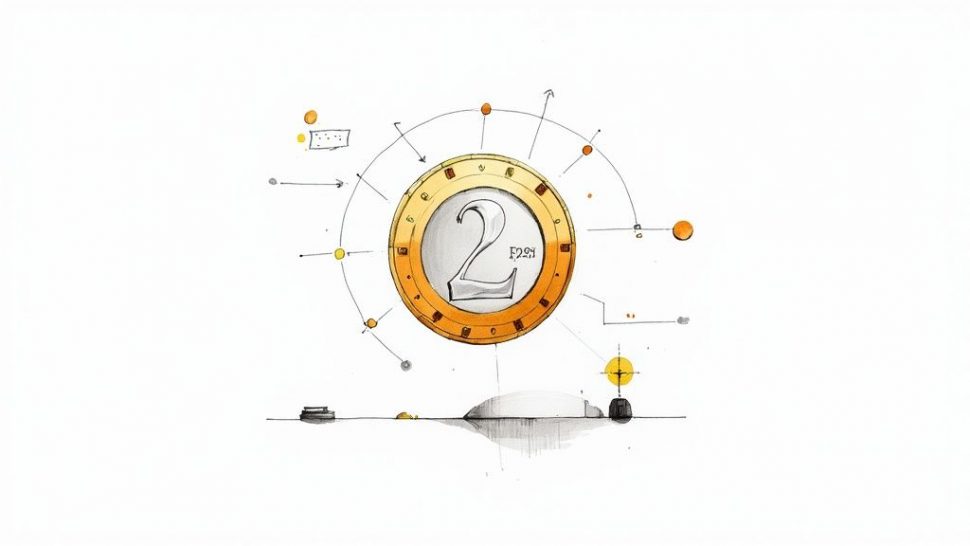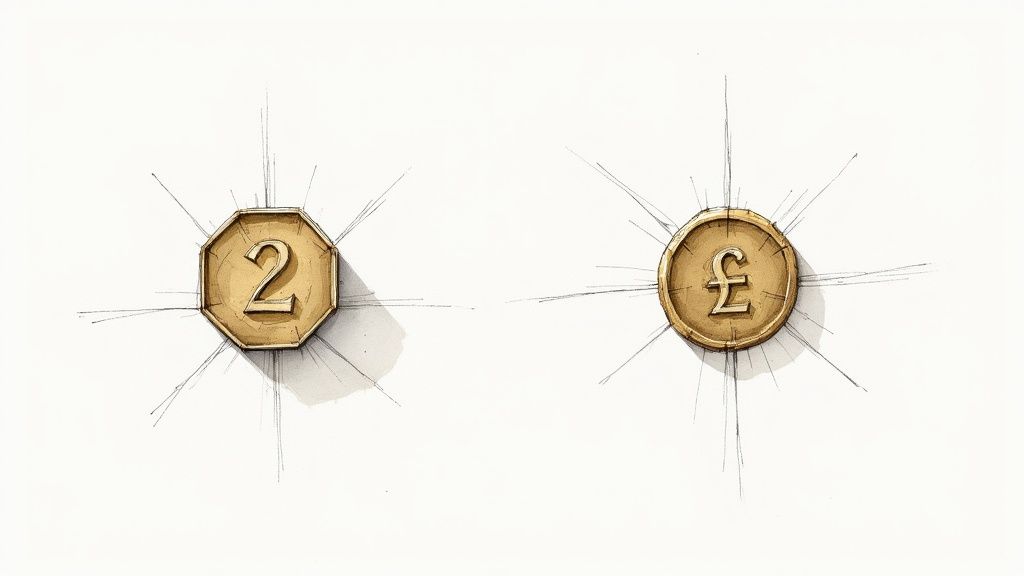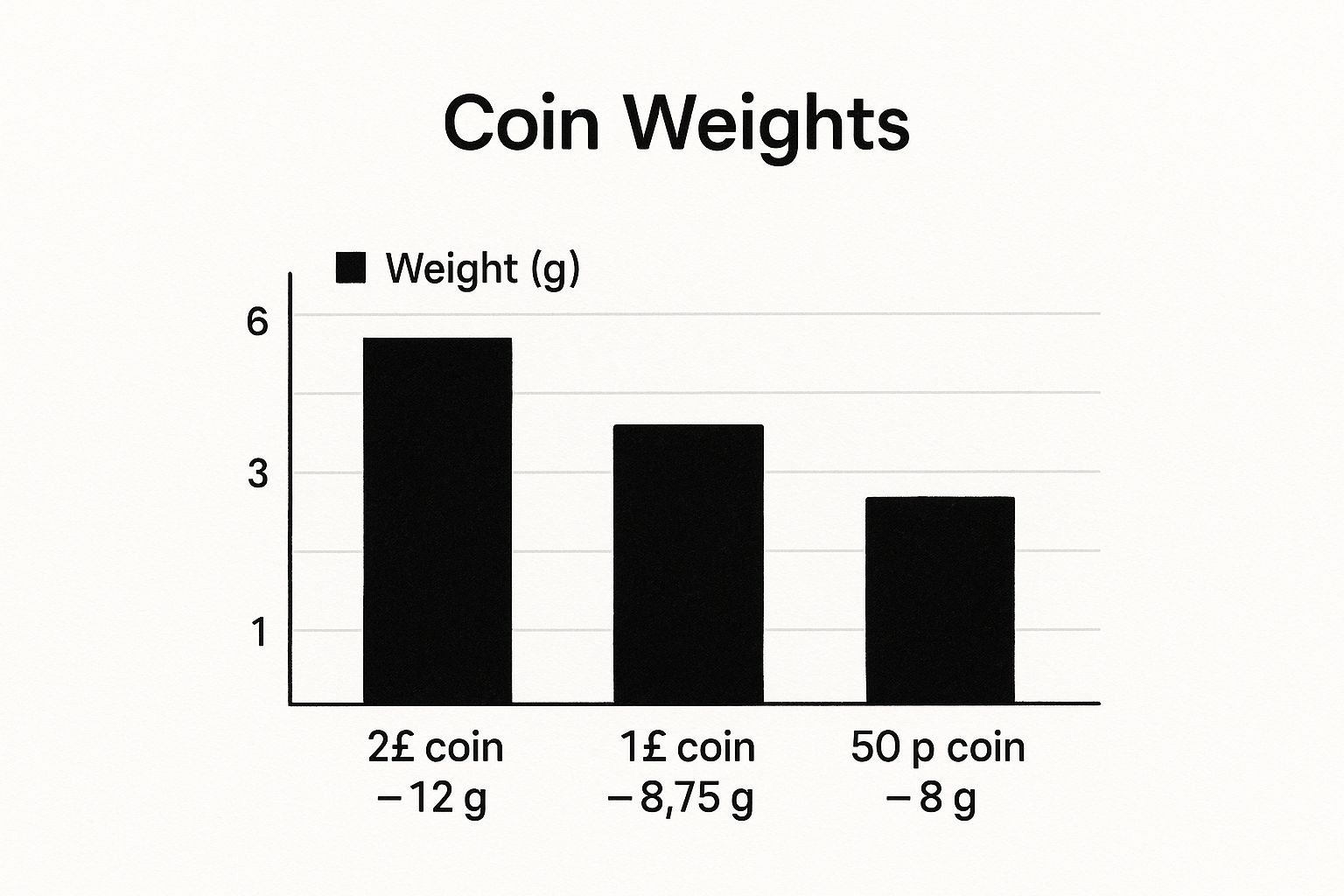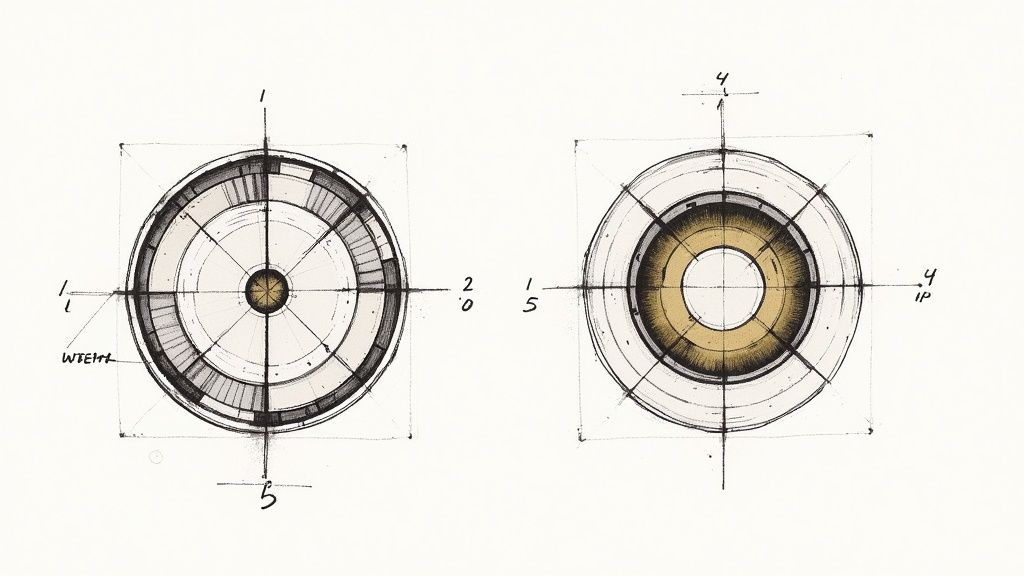How Much Does a Two Pound Coin Weigh?

Posted by: Ian Stainton • 18 Sep 2025
A standard UK two pound coin tips the scales at exactly 12.00 grams. It's a precise weight, not an accident, and it's a crucial part of the coin's design. This ensures it functions perfectly in everything from vending machines to high-speed bank sorting systems.
Understanding the UK £2 Coin Specifications

The modern bi-metallic £2 coin, which has been in our pockets since its general release in 1998, is a clever piece of engineering. It’s made of two distinct parts: an outer ring of a nickel-brass alloy (the gold-coloured part) and an inner disc of cupro-nickel (the silver-coloured centre). This combination isn't just for looks; it gives the coin its specific weight and also contains important security features.
For those who enjoy a quick summary of the key details, here’s a handy reference table with the official specifications.
UK £2 Coin Quick Reference Specifications
| Specification | Measurement |
|---|---|
| Weight | 12.00 grams |
| Diameter | 28.40 mm |
| Thickness | 2.50 mm |
| Outer Ring | Nickel-brass (76% copper, 20% zinc, 4% nickel) |
| Inner Disc | Cupro-nickel (75% copper, 25% nickel) |
This table covers the standard bi-metallic coin you'll find in your change today.
It's important to remember, though, that not all £2 coins weigh the same. The older, single-metal commemorative coins issued before 1997 are noticeably heavier. If you've ever held one, you can feel the difference. You can find out more about the British £2 coin issued from 1986 to see just how different these earlier versions were.
Exploring the Bi-Metallic Composition

The answer to "how much does a two pound coin weigh" is found in its clever bi-metallic design. This isn't just for looks; it’s a carefully engineered combination of two distinct metal alloys that together achieve the standard 12-gram weight.
This two-part structure—a gold-coloured outer ring surrounding a silver-coloured inner disc—is what gives the coin its durability and a unique electromagnetic signature, a key feature in the fight against counterfeiting.
Alloy Breakdown
Each part has its own specific metallic recipe:
- Outer Ring (Nickel-Brass): The golden part is a mix of 76% copper, 20% zinc, and 4% nickel.
- Inner Disc (Cupro-Nickel): The silver centre is made from 75% copper and 25% nickel.
It's this precise fusion of metals that ensures every £2 coin meets the strict specifications required for it to be used in millions of transactions every day.
If you have a collection of old or leftover foreign currency gathering dust, our practical tip is not to worry about sorting it. Our fast, easy, and hassle-free service is 100% guaranteed to handle it all for you. We’re trusted by major UK brands like supermarkets, airports, and even police forces to make exchanging foreign coins and notes simple.
Variations in Two Pound Coin Weights
When people ask "how much does a two pound coin weigh?", the straightforward answer is 12.00 grams. But that's only true for the modern bi-metallic coins you find in your change today. Not every £2 coin is the same, and if you have any older commemorative versions, you'll find they are significantly heavier.
The original two pound coins, struck between 1986 and 1996, were single-metal commemorative issues made from a nickel-brass alloy. While they share the same 28.4 mm diameter as their modern counterparts, these older coins weigh a hefty 15.98 grams. So, if you're sorting through a collection, don't be surprised to find these weightier versions. You can discover more insights about these commemorative British coins to identify them.

The chart above really puts the £2 coin's weight into perspective. It's clearly the heavyweight champion of common UK coinage, weighing considerably more than both the £1 and 50p coins.
If you happen to have a collection of old currency or leftover foreign currency lying around, here's a helpful tip: you don't have to sort it yourself. Whether you need to exchange foreign coins, convert old banknotes, or donate foreign coins to charity, our fast, easy, and 100% guaranteed service handles everything. We are a trusted partner for major UK brands, including supermarkets, airports, and police forces, ensuring a credible and hassle-free experience.
How Coin Weight Ensures Authenticity
Ever wondered, "how much does a two pound coin weigh?" The answer is a very precise 12.00 grams. This isn't just a random number; it's a standard set by The Royal Mint and serves as a cornerstone of the coin's security. This exact weight is one of the most important defences against counterfeits.
Think about all the places you use coins without a cashier. Vending machines, self-service checkouts, and parking meters are all calibrated to accept a coin based on its specific weight, size, and the electromagnetic signature from its bi-metallic design. If a fake coin doesn't meet these strict criteria, it's instantly rejected. It’s a simple but incredibly effective system that helps maintain public trust in our currency.

Maintaining Trust in Commerce
The sheer volume of £2 coins in circulation makes this consistency crucial. As of March 2014, there were an estimated 417 million two pound coins out there, and every single one of them was minted to weigh exactly 12 grams. You can discover more insights about UK coinage to get a sense of the scale.
This same principle of standardisation applies to our other coins, too. The twelve-sided pound coin, introduced in 2017, also has its own set of unique security features. You can learn more about the security features of the new one pound coin in our detailed guide.
Easily Exchange Your Leftover Foreign Currency
It’s one thing to get curious about the details of UK money, like asking "how much does a two pound coin weigh," but what about that jumble of foreign currency you brought back from your holidays? That collection of euros, dollars, and other odd coins and notes sitting in a drawer can be turned back into cash much more easily than you might think.
Many people assume that you need to sort coins before exchanging them, but our helpful advice is that you don't have to! Our service is designed to be fast, easy, and hassle-free. You don’t even need to sort your leftover foreign currency; just send us your mixed collection, and we’ll take care of the rest.
A Service You Can Trust
We're proud to be a trusted partner for many major UK organisations, from well-known charities and supermarkets to airports and even police forces. That trust is built on our transparent and credible process, backed by our 100% guarantee that you'll receive the agreed value with no hidden fees.
So, whether you want to exchange foreign coins and notes, convert obsolete currency, or donate foreign coins to charity, our platform provides a simple, real-world solution for turning that forgotten travel money into something useful again.
Ready to get started? It's simple to exchange your leftover foreign currency with our quick and secure process. Visit our homepage to turn your old coins and banknotes into cash today.
Still Have Questions?
If you've got more questions about UK coins or currency, you're not alone. Here are a few quick answers to some of the things we get asked most often.
Can You Exchange Old British Currency?
Yes, we can! We don't just handle leftover holiday money; we also convert foreign coins and banknotes, including obsolete currency. So if you've found some pre-decimal British coins or old banknotes that have been withdrawn from circulation, we can take care of it all in one simple, hassle-free process.
How Do I Know if I Have an Older, Heavier £2 Coin?
The quickest way to spot one is by its date and how it's made. Take a look at your coin – if it was minted between 1986 and 1996 and is a single, solid gold-coloured metal (that's nickel-brass), you've got one of the original, heavier 15.98-gram commemorative versions.
The modern bi-metallic (two-tone) £2 coins you see every day, minted from 1997 onwards, are the lighter, standard 12.00-gram weight.
What's the Diameter of a Standard £2 Coin?
A standard UK £2 coin has a diameter of 28.40 mm. This measurement is actually the same for both the older, single-metal commemorative coins and the current bi-metallic ones.
Is It a Hassle to Exchange Unsorted Foreign Coins?
Not with us, it isn't. A lot of people put off exchanging coins because they think they need to sort them all first, but we make it incredibly easy. Our service is 100% guaranteed to be fast and straightforward, with no need to separate your leftover holiday money.
We’re trusted by major UK charities, police forces, and even supermarkets to handle their unsorted currency efficiently and transparently, so you know you're in good hands.
Ready to turn that jar of leftover currency or old coins into cash? We Buy All Currency makes it simple. Our service is fast, easy, and secure, with no need to sort a thing. We are trusted by charities, supermarkets and police forces across the UK. Get your 100% guaranteed quote today. Visit our homepage to learn more and get started at https://www.webuyallcurrency.com.
